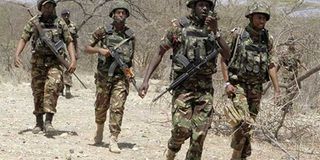Give military special wage consideration

KDF soldiers during a drill. PHOTO | COLLINS OMULO | NATION MEDIA GROUP
What you need to know:
- Unlike other public officers and civil servants, military officers and men aren’t legally allowed to form or join trade unions — which would otherwise negotiate and bargain wages on their behalf.
- This leaves them at the mercy of proposals that may not necessarily be implemented by the Salaries and Remuneration Commission (SRC).
- This calls for a shift in reward and compensation forecasting in respect to salaries.
For its advantageous geographic position, Kenya attracts friend and foe in almost equal measure. It, therefore, has bilateral and multilateral arrangements with other countries, international organisations, multinational corporations and independent entities that it considers as its friends to ensure seamless and symbiotic relations.
RISK FACTOR
Equally, it has its security agencies proactively guarding against aggression or any act that may undermine and/or threaten national peace, cohesion, security, economy and sovereignty by potentially unfriendly countries, organisations and entities. The government ensures a strong military and vibrant security agencies work cohesively to achieve the ultimate goal of peace and security.
The mandate of the Kenya Defence Forces is established and its composition laid out in Article 241 of the Constitution and governed by the Kenya Defence Forces Act of 2012. KDF’s successes date back to its first peacekeeping operations in Namibia more than 30 years ago and several peace support operations, observer missions and civil-military operations (Cimic) in Eritrea, Yugoslavia, Sierra Leone, DR Congo, Liberia and Burundi, among others, to the ongoing antiterrorism campaign in Somalia.
The occupational risk factor of military officers and men is graded “Very High”, followed closely by their comrades in other security agencies. This is attributed mostly to high risk exposure rates, having to operate in austere, complex and challenging environments, long periods of separation from families and direct threat to life due to unswerving or collateral factors, among others.
George S. Patton Jr said: “The soldier is the army. No army is better than its soldiers. The soldier is also a citizen. In fact, the highest obligation and privilege of citizenship is that of bearing arms for one’s country.” It is against this backdrop that many analysts think soldiers are motivated when equipped with good war machines but more with better remuneration.
SACRIFICE
Napoleon Bonaparte opined: “A man does not have himself killed for a half pence a day or for a petty distinction. You must speak to the soul in order to electrify him.” This implies that those who volunteer to serve do so for the love and patriotism of the country, purely conviction from the heart; they, therefore, deserve more than just accurate and powerful war machines.
This calls for a shift in reward and compensation forecasting in respect to salaries.
However, unlike other public officers and civil servants, military officers and men aren’t legally allowed to form or join trade unions — which would otherwise negotiate and bargain wages on their behalf. This leaves them at the mercy of proposals that may not necessarily be implemented by the Salaries and Remuneration Commission (SRC). But several options can be explored — including self-regulation and determination of salaries with SRC guidance and oversight.
The SRC is mandated to set and regularly review the remuneration and benefits of State officers and advise the national and county governments on those of all other public officers. It should explore having security agencies synchronise their salaries based on the “Risk” factor and reward hard work and sacrifice.
Mr Lusiola, a security consultant, is a PhD student. [email protected]





